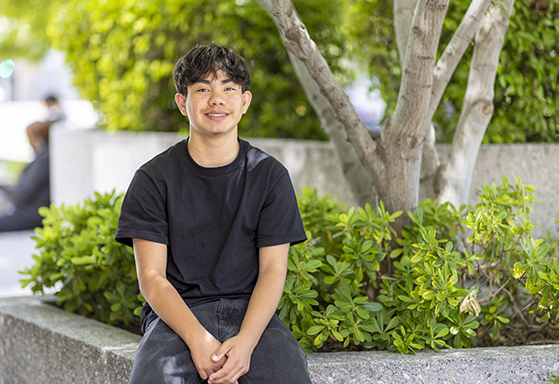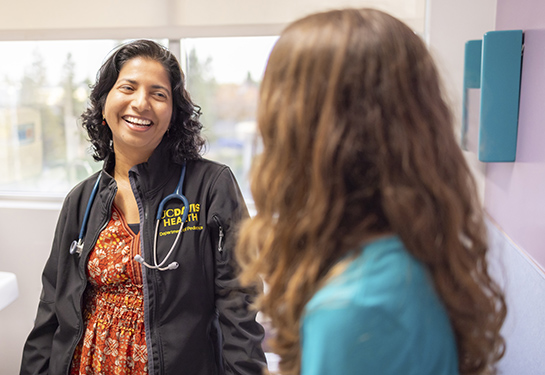Three-year-old patient with spina bifida walks, runs, thanks to fetal surgery (video)
His parents were told he would never be able to walk due to spina bifida. See what Remington can do now.
Three years ago, Chloe MacCullough received the life-changing news that her unborn child had a neural tube defect. After further testing, her baby was diagnosed with myelomeningocele, better known as spina bifida. She was told he may never be able to walk.
“Looking back on it, I get a little emotional thinking about how scary it was. I wish I knew then what I know now,” Chloe said. “Being a first-time mother, you envision your child’s future. And when something doesn’t line up with the way that you viewed it, it’s really hard to move past that.”
Spina bifida occurs when spinal tissue fails to fuse properly during the early stages of pregnancy, leading to a range of lifelong cognitive, mobility, urinary and bowel disabilities. It affects 1,500 to 2,000 children in the U.S. every year.
Only four hospitals in California specialize in fetal surgery, which can treat spina bifida in the womb. Chloe, an Esparto resident, was lucky to be living less than an hour away from one.
After her baby’s diagnosis, Chloe’s doctor referred her to the UC Davis Fetal Care and Treatment Center, inland Northern California’s first comprehensive fetal diagnosis and therapy center. It is the Sacramento area’s only choice for on-site fetal surgery, including open fetal surgery, for spina bifida. It is led by Shinjiro Hirose, a nationally recognized fetal surgeon.
Chloe and Kyle MacCullough met with Hirose to discuss their options.
“It was very stressful and there were so many unknowns, but we had a great team at UC Davis,” said Kyle MacCullough, Chloe’s husband. “Dr. Hirose was awesome. He was very good at letting us know that there was light at the end of the tunnel.”
After an MRI and amniocentesis ruled out any genetic abnormalities, Chloe was cleared for fetal surgery – a two-and-a-half hour operation that would change her life and her unborn baby’s future.
During surgery, Hirose made a caesarian-section like incision on Chloe’s uterus to expose the defect on her baby’s back. Pediatric neurosurgeon Marike Zwienenberg worked with Hirose to repair the defect so further damage would not take place in the womb.
A groundbreaking treatment
A UC Davis Health team has received FDA approval to test a groundbreaking spina bifida treatment combining fetal surgery with stem cells, which could improve outcomes for more spina bifida patients. A clinical trial is expected to begin in early 2021. Read more
On Sept. 4, 2017, Chloe gave birth to Remington MacCullough at UC Davis Medical Center.
Spina bifida patients can develop mobility issues, bladder or bowel incontinence, and hydrocephalus, a build-up of fluid in the ventricles within the brain, which often requires a shunt to drain the fluid.
But Remington was kicking his legs, moving around and lifting his pelvis off the bed within days of his birth. He did have hydrocephalus, but he never needed a shunt. It was a positive sign.
Remington has continued to surprise his parents Chloe and Kyle over these last three years. Their favorite milestone? Remington’s first steps.
“He would go a couple of steps and fall into us,” remembered Kyle. “He was laughing because we were laughing. We were really celebrating that he was able to do that.”
Chloe remembers hoping during her pregnancy that her son could at least swing his hips and have some form of upright mobility.
Now three years later, you would never know Remington was diagnosed with spina bifida. His parents call him curious, adventurous and a jokester. He is active and likes to run around.
“We made the right decision for him with the right hospital with the right doctors,” Chloe said. “Remi is a little blessing. We are so thankful.”
“We would recommend UC Davis to anyone,” Kyle said.
Related stories and resources
Spina bifida MOMS trial
Prenatal stem cell treatment improves mobility issues caused by spina bifida
Spina bifida patient healthy, happy after fetal surgery
Stem cell treatment for children helps dogs first
UC Davis Health and Shriners Hospital partner to provide expertise to spina bifida patients
Researchers seeking a cure for spina bifida get a step closer to their goal
Alex’s story
Learn about spina bifida (information from the U.S. Centers for Disease Control and Prevention)



